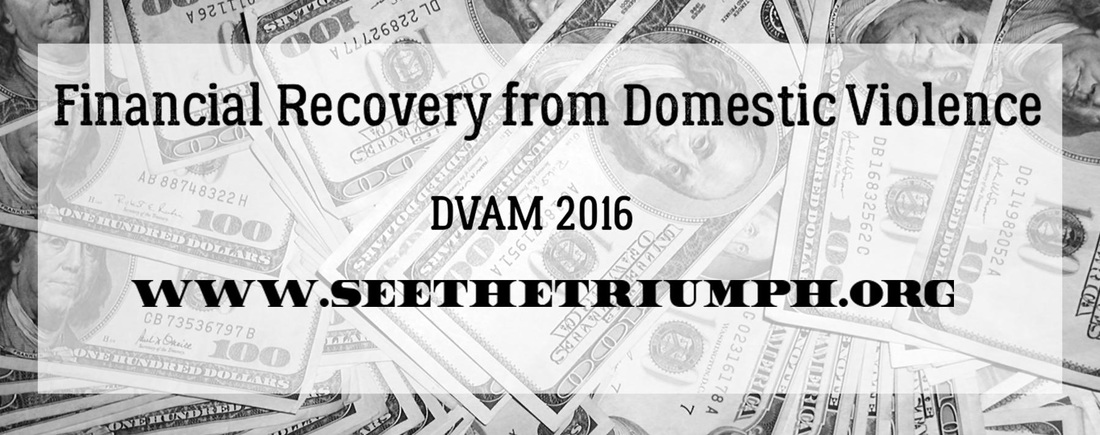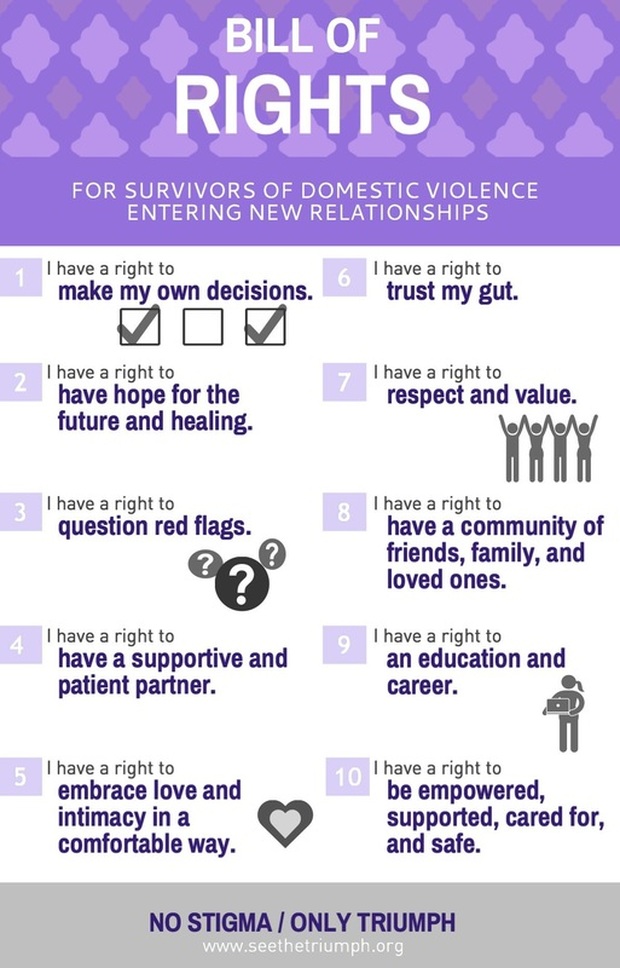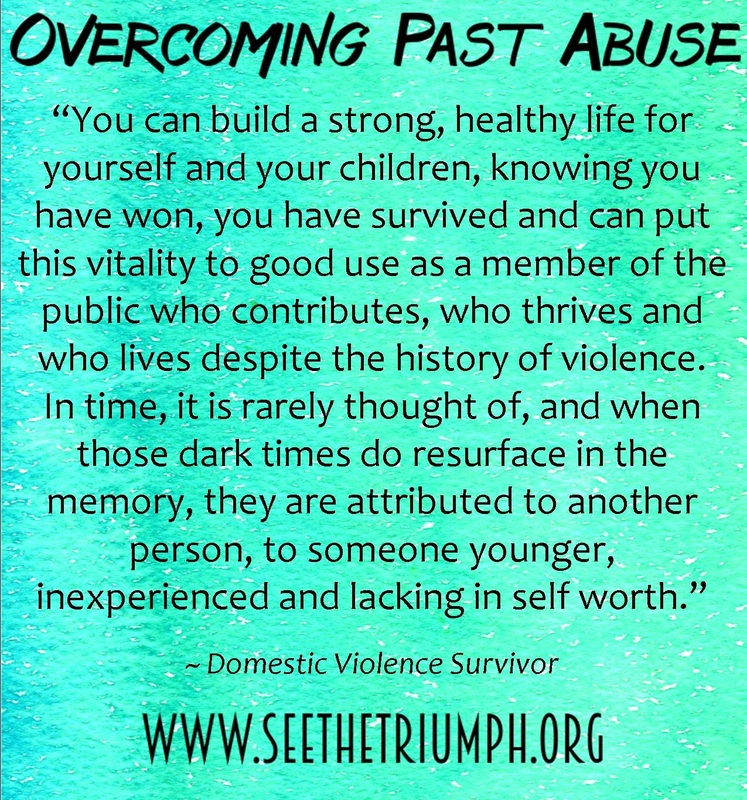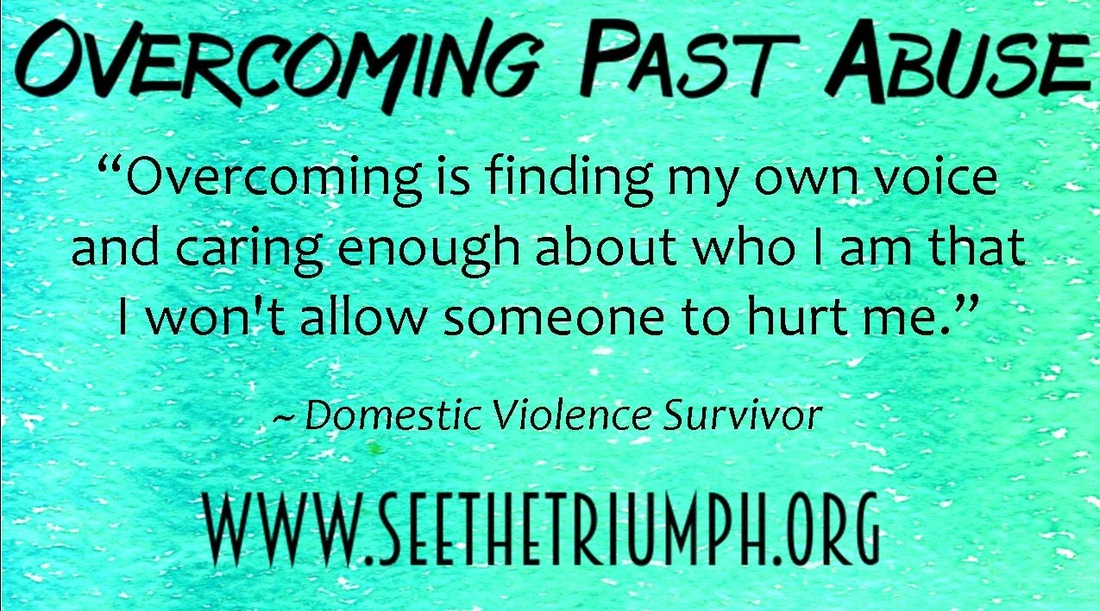|
By Eileen Martin, See the Triumph Contributor
“…It matters not how straight the gate, How charged with punishments the scroll, I am the master of my fate, I am the captain of my soul.” Invictus ~ William Ernest Henley Building a Support System In order to live abundantly and joyfully we need deep human connections, and truly connecting with one another requires raw vulnerability. In the aftermath of a domestic violence relationship, this is a very scary proposition, I know. Trusting others, even ourselves, is pretty dang frightening; yet, it has been moments of raw vulnerability that have led me to the most meaningful relationships in my life after leaving my domestic violence relationship. The same vulnerability has also led me to recognize what connections were tenuous at best and needed to be cut. Yes, it is okay to walk away from what hurts your soul. In fact, this should be one of the greatest lessons of being a survivor. You have the power. You can create a nurturing support system that sustains you and helps you grow. “And I feel like I am naked in front of the crowd ‘cause these words are my diary screaming out loud and I know you’ll use them however you want to” Breathe ~ Anna Nalik Trusting in Yourself How very difficult it is that we have an innate need for self-protection of our ego and an innate need for true connection, yet the two are like oil and water; they don’t mix. How often do we miss the opportunity for human connection because we are afraid of “being naked in front of the crowd?” My “naked” moments have revealed to me the ability of open and self-accepting people to not only allow, but also sit comfortably with my vulnerability. The desire for meaningful connection can lead us astray if we are trying to fit in and be accepted rather than being open, raw, and understanding. Trying to meet other’s expectations only creates a perpetual cycle of failure and missed opportunities for true human connection. Not everyone will “get you,” and that is okay. Learning to be comfortable enough in our own skin to be vulnerable helps us traverse moments of self-doubt, rejection and fear and creating a supportive network provides a soft place to fall when life comes at you hard and fast. Nourish, Grow and Shine What nourishes you? Providing nourishment for our soul helps us to be self-accepting and, in turn, can help us to be bravely vulnerable and open to connection. So, be an explorer and try new and unexpected adventures to discover what brings you joy. Invite someone you would like to get to know better to meet for coffee. Pay attention to what peaks your interest. Follow that, and dig deeper. Share what makes you smile and what makes you anxious with a friend. Most importantly, go forth boldly with an open and trusting heart and let your light shine and your world will bloom in unimaginable ways. 10/31/2016 Financial Recovery from Abuse: Taking Control of Your Life by Taking Control of Your FinancesBy Christine Murray, See the Triumph Co-Founder
All this month, our focus at See the Triumph for Domestic Violence Awareness Month has been on the financial impacts of intimate partner violence for victims and survivors. As we’ve discussed throughout the month, the financial costs of abuse are often substantial, and these can add a lot of challenges and complexity to the recovery process in the aftermath of an abusive relationship. Whether these financial impacts come in the form of impaired career advancement, legal costs in family court, and/or the costs of physical or mental health care, the toll on survivors can be huge, especially as they work to rebuild their financial lives while also working on their physical and emotional recovery. All of these financial challenges can be overwhelming. However, overcoming them is possible. As we wrap up our Financial Recovery series today, today’s blog post will offer some suggestions for survivors of abuse to use to take control of their finances, and ultimately to take control back over their lives. If you or someone you know is struggling with financial challenges as part of the process of recovering from abuse, consider the following strategies: 1. First, be patient and gentle with yourself. You may feel overwhelmed and afraid by the financial challenges you face. Depending on the extent to which your abuser financially abused you, the financial toll of the abuse may indeed be major. If this feels like an overwhelming issue to address, reassure yourself that recovery will take some time, but it is possible. Consider writing affirming messages to yourself in a place where you’ll look at them often. Whenever you feel overwhelmed, practice self-care and use your coping strategies to manage the stress in healthy ways. 2. Take stock of your overall financial picture and the financial impacts of abuse. Although it may be tempting to put off or avoid looking at your financial situation, you can only begin to plan how to address it once you’ve done a thorough assessment of where your finances stand today. Set aside time when you can spend a few hours to list all of your accounts, assets, debts, potential future expenses, and any other financial details of your life currently. As best you can, try to organize this information without worrying about it. It may help if you think about your financial situation like a business, and you are the manager. Take your time to really understand your financial starting point, so you’ll have a clear picture of where things stand today. 3. Think of one small change you could make in the near future to begin to improve your financial situation. Before you start dreaming big about your financial future, it’s a good idea to set yourself up for some small successes along the way. Once you’ve taken stock of your financial picture, try to identify one small change you could make to begin taking control of your finances. For example, perhaps you have a small debt that you could pay off with your next paycheck. Or, maybe you could start using a written budget to help organize your income and expenses for the month. By starting to focus on small, realistic financial goals that you can accomplish quickly, you’ll begin to notice a change in how you feel when you realize that you can take control of your finances. You may not be able to change everything overnight, but at this stage, it’s more important to simply start building momentum and feeling like you have more control over your finances. 4. Start dreaming big about your financial and career future. Once you’ve started gaining a little momentum for improving your finances, it’s time to step back and think about what your ideal vision for our economic future would look like. Do you have any goals or dreams for your career or education that you had to put on hold due to your abuser’s control of you? If you think of your life when you reach retirement age, what impact would you liked to have made on the world around you? What financial goals do you have for yourself? Perhaps you dream of owning your own home or taking your children on a nice vacation. Give yourself time to think through what you’d like for your future life and career. This may be a very difficult step, especially if your abuser told you things like, “You can’t do anything right,” or “You’ll never be successful.” Acknowledge that these statements have impacted you in the past, but remind yourself that they don’t have to define your future. Trust that you have unique skills, talents, and contributions to offer the world, and allow yourself the time and opportunity to figure out how you’d like to make that impact. 5. Map out a plan to get from your starting point to your vision for your financial and career future. Once you’ve dreamed big about what your life could be, it’s time to start working on a plan to get you from where you are now to where you want your life to go. This stage might involve adjusting your dreams to make them more feasible. For example, in your big dreams, you may have wished you could become a doctor. Although you know you’re smart enough for that path, you may decide that you want to find a career path that will not require as long of a schooling process, so you begin exploring other career paths in the medical field. This stage also should involve doing some research to understand the steps that you’ll need to take as you move toward your career and financial goals. You may find it useful to start using a specific financial planning process, such as the 7 Baby Steps proposed by financial guru, Dave Ramsey. If it’s a career goal you’re exploring, this research might involve talking to professionals already working in that field or learning about relevant educational programs. As much as possible, map out a very specific set of steps you’ll need to take to move toward your financial and career goals. The more concrete steps that you identify, the more you’ll be able to track your progress along the way. 6. Build a strong network of supportive people and resources. You don’t have to go through this journey on your own. Surround yourself with people who you can depend on to encourage and support you along the way. If there are people in your life who can’t or won’t support you in your goals, set boundaries with these people to limit their impact on you. Instead, focus your time and energy on connecting with others who will be there for you and will cheer you on as you reach your goals, and even when you face setbacks along the way. In addition, connect with resources that can help support you in achieving your goals. This could be a career counselor, a financial advisor, a community agency, and credible online resources for financial information. These positive sources of support will be invaluable to you on your journey toward financial recovery. Financial recovery from abuse can be a long, complicated process. In many ways, your financial recovery is closely linked to other aspects of recovery, such as your emotional recovery and your process of reconnecting with a support network. One of the greatest aspects of financial recovery is that it offers tangible opportunities for you to feel success. Other aspects of recovery can feel a lot more fuzzy than financial recovery. It can be harder to track your emotional recovery process than it is to track the numbers involved in your financial recovery process. In that way, financial recovery offers tangible successes that can help to increase your confidence in yourself. Each big and small financial goal you achieve offers you a chance to feel successful and empowered by the control you are taking back from your abuser. By taking control over your finances and believing that you can work toward positive goals for your life and your money, you have the chance to rewrite the script for your future. This process may be difficult, but it is well worth it! 10/27/2016 Rebuilding Your Life After AbuseBy Christine Murray, See the Triumph Co-Founder
You’ve left the abuse behind. You’re determined not to go back. You’ve realized that you deserve more than an unsafe, abusive partner who controls and demeans you. You deserve better--a happy, fulfilling life in which you can make a positive difference in the world. You know, deep down, that great things are in store for you, even if you can’t fully picture what that will look like or how you will get there. You’re ready to step boldly into your new life, free from abuse. But first, there may be some messes that you need to “clean up” in the process of moving on from your abusive partner. Your finances may be limited--or even non-existent. Your abuser may have blocked you from going for your educational or career goals, and you’re frustrated when you think of where you could be or should be if you hadn’t fell prey to that person’s controlling tactics. Today, I want to encourage you. You can do this! You are not alone on the challenges you’ve faced. We’ve heard from hundreds of survivors of abusive relationships through our See the Triumph research program. Time and again, we’ve seen that recovery, accomplishment, and triumph are possible in the aftermath of abuse. It’s true that the path to this new life may be more complicated for you now, but you showed your strength surviving in and leaving the abusive relationship, and that same strength will be your inner guide as you rebuild your life and career after abuse. At See the Triumph, we’ve heard from many survivors that the abuse they experienced left them feeling disappointed by all that their abusers had taken from them, emotionally, financially, and in terms of lost opportunities. As one survivor told us, “I am completely behind the rest of the world because I have had to spend so much time dealing with an abuser.” Rebuilding after abuse may involve starting over completely, from scratch. Safety risks may persist, as abusers can continue to use their abusive tactics even after the relationship ended. As another survivor said, “I had to move twice running from him. People don’t understand how afraid you can be. Others only judge and don’t help. And yet, what we’ve seen in survivors is a fierce determination and tenacity to move forward, by doing whatever it takes. Consider the following quote from a survivor in our research: “I am over $100,000 in debt (living off student loans and credit cards), all while working four jobs and going to grad school to try to get my life back in order.” Although it is unfortunate that this survivor is incurring more debt during the process of rebuilding, we can only stand in awe of her commitment and dedication to bettering her life--working four jobs is no easy feat, and then she added graduate school on top of that. This survivor, like many others we’ve heard from, shows just how determined people can be when they put their mind to it and commit to building a safe, fulfilling life in the aftermath of abuse. In many cases, there are no easy solutions to rebuilding your life following abuse. Of course, there are strategies that can help this process, such as (1) surrounding yourself with as much positive, encouraging social support as you can find, (2) mapping out a vision for what you would like your future life to be like, (3) developing a plan for how to get your life from your starting point now to making that vision a reality, (4) setting meaningful, realistic goals to help you track your progress along the way, and (5) practicing intentional self-care so you can cope with the frustrations and challenges that arise. It may be tempting at times to wish you could simply wave a magic wand to completely erase the past and fast forward to a future time when your life feels more stable and “rebuilt.” At times, it is a good idea to simply notice and appreciate those feelings and allow yourself to feel the emotions that arise with this tempting wish. However, I also encourage you to remember to appreciate the beauty in the struggle of rebuilding your life following abuse. You will find strengths in yourself that you might never have known existed as you face each challenge, one-by-one, and see that you can overcome this. You can leave the past behind, but still benefit from the powerful person it has made you today. You can move forward toward building a life that reflects the unique person that you are and the positive impacts that you can have on the world and people around you. With each challenge you face in the process of rebuilding your life after abuse, rest in the confidence of knowing that this process offers you opportunities to learn about yourself, identify people in your life who are tried-and-true supporters, and tap into the depths of your strength and courage. You are worth it. By Christine Murray, See the Triumph Co-Founder
At See the Triumph, we celebrate the courage and resilience of survivors of past intimate partner violence. They show this courage and resilience while they are in the relationship, as well as through the recovery process after the relationship ends. These personal strengths are needed to heal and recover from the many challenges that abusive relationships can bring--including physical injuries and other health-related consequences and the emotional toll of dealing with an abusive, controlling partner. In the face of these challenges, survivors show a remarkable amount of bravery as they work toward peaceful, safe lives for themselves and others. This month, for Domestic Violence Awareness Month 2016, we’re taking a specific focus on another aspect of recovering from abusive relationships that doesn’t get discussed as much as the physical injuries and emotional and mental health consequences of abuse. However, this aspect of recovery can present huge challenges for survivors as they rebuild their lives following an abusive relationship. Our focus will be on financial recovery from domestic violence. Through our research that is the foundation of See the Triumph, our eyes have been opened to the depths of financial challenges and costs that can stem from abusive relationships. Despite the extensive financial burdens that survivors can face--including physical and mental healthcare costs, challenges to gaining and keeping employment, and legal expenses--the financial consequences are often overlooked in comparison to the physical and mental health impacts of abuse. Of course, the physical and mental health impacts are important to address, and one of the reasons that it’s important to address the financial impacts of abuse is because financial challenges complicate survivors’ recovery processes in other areas of their lives. For example, it’s much more difficult to heal emotionally and physically if a survivor can’t afford proper healthcare or counseling. Also, it’s more difficult to avoid returning to abusive partners if survivors don’t have jobs through which they can support themselves. And, the stress of living life on the brink of poverty can add an emotional burden to survivors’ daily lives that makes it more challenging to envision a positive, prosperous long-term future. And so, this month for DVAM 2016, our focus at See the Triumph is to raise awareness about financial recovery from abusive relationships. We’ll discuss some of the different types of financial abuse, as well as delve more in-depth into some of the specific ways that survivors’ financial and economic well-being is impacted by abuse. As always, our aim is to show that--despite the many challenges that they often face--survivors’ courage and resilience is truly remarkable. Far too many survivors begin their recovery process with virtually no financial resources to their name. The fact that they embrace this daunting process in pursuit of a safe, peace-filled life is just one more reason that survivors warrant our respect, support, and admiration. By Jordan Austin, See the Triumph Guest Blogger
Safe and healthy relationships are a basic human right. For survivors of domestic violence, beginning or engaging in intimate relationships may pose unique challenges. The concept of thriving within the shelter of others may very well now have a new meaning, new difficulties, and new hesitations. After being victimized by a partner who was supposed to be supportive and kind, it’s understandable to have questions or fears about how to navigate future intimate relationships. To quote one participant in See The Triumph’s research, “I still have scars; they will always be a part of what made me who I am today.” If you have experienced the hurtful sting of abuse, you may still be living with the complications today. It’s important, though, to have hope toward the possibility of safe and supportive relationships, either intimately or with friends and family members. It’s also important to remember that survivors are not destined to repeat cycles of victimization. You may hold fears around fully trusting yourself or others again because of a previous relationship. Time may be necessary to learn about yourself, understand your views of others, and regain power and control over your life again. However, in addition to fostering these aspects self-awareness, there are rights you have as a survivor as you begin the process of moving toward healthier relationships. There is a chance an abuser has told you otherwise, that you do not deserve worth, importance, or efficacy. Combatting these internalized messages will help support you along your healing journey. In any future partnership, you have a right to make decisions for yourself again. Should you desire a community, a career, an education, a loving partner, you have a right to these things. Embracing intimacy and connection again may cause you to feel uncertain or uncomfortable. You have a right to welcome or decline new experiences and have a partner who is supportive and patient with you. No relationship will be perfect, but you also can question red flags and trust your gut; you are the expert on you. Desiring an intimate connection is a natural need of humans. You have a right to have hope for the future and healing. You have a right to be cared for. You have a right to be safe. Jordan Austin is a graduate of the University of North Carolina at Greensboro from the Couple and Family Counseling track. She is an advocate for secure, safe, and positive interpersonal relationships. Jordan hopes to embolden survivors of IPV and domestic violence as they reclaim their voice during the healing process. 8/11/2016 Trusting AgainBy An Anonymous Guest Blogger
“Don’t make me pay for what he did…” Nearly 4 years passed before beginning another committed, intimate relationship since my previous abusive relationship ended. Given my long history with my ex, a large part of my recovery from the abuse involved me getting to know myself in an intimate way without the “burden” of a relationship. As I reflect even more now as I write this piece, I am reminded of how free I felt after leaving the abusive relationship. Even during those difficult healing moments, I was always possessed by such an overwhelming relief that the abuse was finally over. For a while after my previous relationship ended, I was psychologically broken in my perception of relationships in that I equated an intimate relationship to pain and suffering. I can say that I was not opposed to casually dating and “keeping things light,” but I was opposed to entering another committed relationship again because my trusting nature had been nearly broken and fear of being hurt again paralyzed my heart. That was until an unexpected someone came along nearly 4 years later and changed all of that… Approximately 6 months passed between meeting my current partner and making our relationship official. During those months and even now, almost 2 years into our relationship, my partner continues to treat me with a type of love, support, and understanding I have never experienced. For a long time, even at times now to be honest, it scares me because my abuser was also loving, supportive and understanding…in the beginning. The abuse started nearly 2 years into our 8-year relationship. Despite the overwhelming amount of patience my current partner has displayed, he has said on several occasions, “I’m not him…don’t make me pay for what he did.” Sometimes I struggle not to compare my current partner to my previous abuser. Sometimes fear does get in the way of our ability to move forward in our relationship because I’m afraid that eventually, things will go south no doubt, because that’s just how relationships work, right? Wrong! What I had to learn and am still learning is that healthy relationships do have their challenges as well. Given my history of trauma, we were bound to encounter difficulties as it relates to trust issues, on my part especially. However, with a loving, supporting, and patient partner, a corrective emotional experience can take place and over time, I can say that gradually, I’ve learned to rebuild that trust again. I can speak for myself and for others that have experienced abusive relationships that the healing process is intentional. I still continue to seek counseling now. Even though things are going great in my relationship, I know that keeping in touch with my feelings as they come up is crucial not only to my own mental health, but to the success of my relationship. I know firsthand that trusting again is much easier said than done. Even now, it is difficult sometimes to move to the next step in my own relationship when pondering commitments such as marriage and having children. However, experiencing new people and new things have a way of changing one’s mind about the world and the people in it. So, to those reading this post – there is hope out there. Believe me, I was very cynical for a while, for good reasons I must say! Protecting your heart is important and sometimes necessary to prevent pain and suffering. I would say to be intentional on your healing process because it is critical to your health on an individual and relational level. Don’t let your heart grow cold and don’t give up on love because if you do, your abuser has won. By Eileen Martin, See the Triumph Contributor
Just Who Do You Think You Are? It’s the little voice in your head, or sometimes the voice from others, that can stop you in your tracks while healing from domestic violence. The voice asks “Just who do you think you are?” Just who do you think you are to have feelings, wants, and needs? Just who do you think you are to walk away from a relationship, a marriage? Just who do you think you are to break up a family? Just who do you think you are to believe you can make it on your own? Just who do you really think you are? Honestly, there is some sense of control in holding onto these thoughts because they are familiar. You have been accustomed to having doubt and shame fuel your thoughts and, let’s face it, you have been told you are unworthy of love, that you are crazy, or that you are worthless. So now you are supposed to suddenly believe in yourself and consider the alternative? Sometimes the fear of the unknown prevents us all from considering that we may have been told a lie and our thoughts are just. not. accurate. So, who DO you think you are? What are you telling yourself? What are others around you saying? What seeds of doubt have been planted in your mind from your abuser? Your family? Society? Have you ever given yourself permission to question your thoughts? We all have some negative thought patterns that feel really heavy and burdensome. But life feels so much lighter and things often look brighter when we can really recognize and challenge the negative thoughts and replace them with a kinder gentler version. Have you ever questioned what you have been told to believe? About yourself or how life ought to be? Well, now you get to choose your own version, your own reality, your own thoughts and that can be pretty powerful indeed! Planting power seeds: Recognize and challenge negative thinking patterns When I recognize my own negative thoughts, I ask myself a powerful question: Would you say to a friend, sister, or daughter or anyone you care about what you say to yourself? More than likely the answer is no. We all deserve the same amount of care and concern we afford to others we love. So lets start there. Be mindful when you find you are saying anything to yourself that you wouldn’t say to someone you love and care about. You are deserving of loving and caring thoughts and words, and most importantly, self-forgiveness when you mess up. We all inevitably mess up. We all are human. Remember, YOU are someone’s friend, sister, or daughter. Firmly Planting: Recognize and challenge what others say to you So, get curious. Pay attention to your reactions when talking with others. Recognize what feels right and what makes your stomach lurch a little bit. Why is your body responding? Become aware of your body and how it responds to others. Your gut instinct is a powerful tool in discerning between what is meant to harm and what is meant to heal. Now it is time to firmly plant yourself in solid ground by self-nurturing, by being gentle with yourself if you make a mistake, by recognizing your amazing ability to put one foot in front of the other when life comes at you hard. At the end of the day, you are strength and you deserve to bloom. 10/3/2015 What Triumphing Over Abuse Means To MeBy Darby Munroe, See the Triumph Guest Blogger I am a Domestic Violence survivor. Every day is an act of survival, even years later. I have PTSD from what I experienced, from what was forced on me. Even though I am relatively safe now, I have to overcome triggers and reactions that debilitate me in my daily life. Being out a few years, I look back and celebrate the courage it took to leave, to fight for my and my child’s safety, to stand up for myself, and to have a voice. The decisions and actions I make everyday increase my independence, increase the control I have over my own life, and are minute-by-minute victories. Some days, getting a full night of sleep or washing the dishes are great accomplishments. Other days, just recognizing and acknowledging my struggles, where they come from, and allowing myself to rest and process those issues are huge accomplishments. Prior to the trauma, I had grown up in what I thought was a loving family. I was adopted, but my parents never really understood me, supported me, or allowed me to be myself. They were doing their best, but expected me to meet their needs, instead of them meeting mine. It wasn’t exactly healthy, but it was all I knew. What I didn’t know was who I was, what I wanted with my life, or how to get there. I spent my 20’s bouncing from job to job, having adventures, or anything that might make me feel true to myself. I was passionate about helping at-risk youth. I was a teacher and was working toward a master’s degree. Then, my ex came along. He appealed to my passion for helping kids in need. He attacked my most valuable asset, my mind. He was so charming and persuasive and had me convinced to compromise values, my beliefs, and myself. He saw my potential and aimed to subdue it, as if it were something to be conquered. I recognize all of these unhealthy patterns, and know how to set healthy boundaries now. I am able to quickly identify what triggers me and move on. I went from survive to thrive. In the few years I have been out, I got re-certified to teach, earned two master’s degrees, got my dream teaching job, and am working toward a doctorate degree. I do have accommodations to help my performance in all of these because of my PTSD. In the near future, I am going to start a non-profit for advocacy and education. I want to help kids with high ACE scores and DV survivors, and teach high conflict parenting courses. I want to train teachers to work with kids who have experienced trauma, which is 1 in 4 kids. Domestic violence, abuse and neglect all show up in the classroom as behavior and learning problems. I have found meaning in what I went through, and I am taking that and using it to help others who are going through the same thing. Once I got out, and things calmed down, I found a great art therapist who does EMDR. For the first time in my life, I am really getting to know and understand myself. I acknowledge my history and its role in my story. I have accepted that I will never get back to the way things were before, and that I have changed. But these things help me to empathize and relate to my son, the students that I work with, and the women that I advocate for. I am embracing myself, loving others, and spreading hope. This is what triumph over abuse is to me.  Darby Munroe, M.Ed. is an educator and advocate who works with at-risk youth, children with high ACE scores, and abuse victims. She teaches math during the day, and high conflict parenting classes at night. She lives with her son in a small South Florida coastal town where they love to create art, go to the beach, hike, kayak, and have adventures. |
Archives
July 2024
CategoriesAll About Intimate Partner Violence About Intimate Partner Violence Advocacy Ambassadors Children Churches College Campuses Cultural Issues Domestic Violence Awareness Month Financial Recovery How To Help A Friend Human Rights Human-rights Immigrants International Media Overcoming Past Abuse Overcoming-past-abuse Parenting Prevention Resources For Survivors Safe Relationships Following Abuse Schools Selfcare Self-care Sexual Assault Sexuality Social Justice Social-justice Stigma Supporting Survivors Survivor Quotes Survivor-quotes Survivor Stories Teen Dating Violence Trafficking Transformative-approaches |
Search by typing & pressing enter







 RSS Feed
RSS Feed